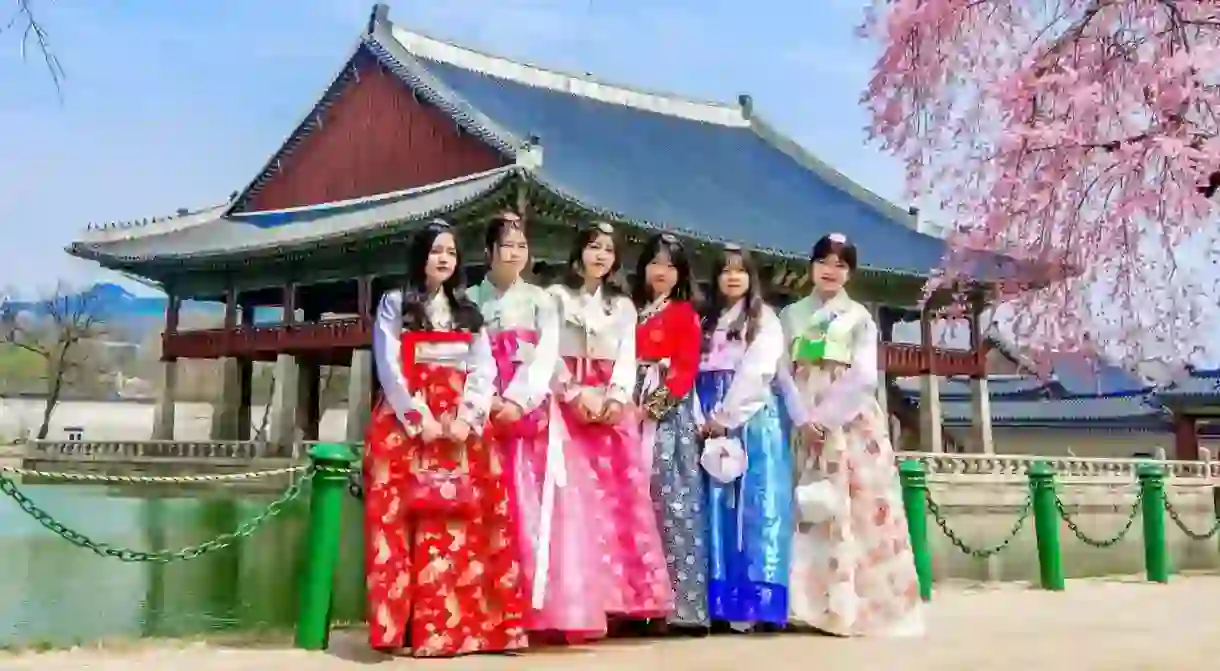The Most Beautiful Korean Names and What They Mean

In both South and North Korea, a person’s name consists of a family name followed by a given name. Traditionally, most Korean given names are made up of two Sino-Korean morphemes, with the first being shared by everyone of the same generation in the family, and the second specific to the individual. Each syllable has a meaning – determined by the hanja used to write it – that reflects the traits and characteristics Korean parents would like to imbue upon their child. The following are among the most beautiful.
Book your spot on our Soulful South Korea trip – a 10-day adventure featuring a meditation session in a Buddhist temple, a cooking class in Busan and a karaoke night in Seoul.
Chun-ja (춘자)

Stemming from the Sino-Korean chun meaning ‘spring‘ and ja meaning ‘child’, Chun-ja implies innocence and purity. It is one of a number of Japanese-style names ending in ja that were especially favored during the Japanese occupation (1910-1945) but has since declined in popularity. Chunja is also the stage name of Hong Su-yeon, a South Korean singer known for her androgynous appearance.
Ha-joon (하준)
Meaning ‘summer’ or ‘great, grand’ (ha) and ‘talented, handsome’ (joon), Ha-joon has in recent years become a particularly popular name for boys. In fact, it was the third most popular male name given in 2015. Unsurprisingly, it makes for a great name for entertainers; for example, it’s the stage name of The Flower in Prison actor Seo Ha-joon.
Ji-woo (지우)
There are 46 hanja with the reading ji and 42 hanja with the reading woo on the South Korean government’s official list of hanja, which may be used in given names. However, the most popular meanings include ‘will, purpose, ambition’ (ji) and ‘house, eaves, universe’ (woo). Although Ji-woo is a unisex name, it was the eighth most frequently given name to baby girls in 2008, and the third most popular name in 2013 and 2015.
Chang-min (창민)
A strong and righteous name for boys, chang means ‘bright, clear’ or ‘good, proper’ while min translates to ‘strong, robust, tough’ or ‘stone resembling jade‘. Well-known Chang-mins include 2AM member and singer Lee Chang-min, TVXQ member and actor Changmin, and baseball player Sim Chang-min.
Seo-yeon (서연)
Meaning ‘felicitous omen, beautiful and graceful’ in addition to other hanja combinations, Seo-yeon is a fairly common female name. In recent years, it has also been the name many adult women have used after changing their name to make it sound more modern. People with this name include Kim Seo-yeon, Miss Korea 2014, as well as the fictional character Lee Seo-yeon in the melodrama A Thousand Days’ Promise.
Jae-sang (재상)
Encouraging the traits of generosity, compassion, and empathy, Jae-sang means ‘load, carry, transport’ (jae) and ‘mutual, reciprocal, each other’ (sang). Perhaps the most popular Jae-sang in Korea is ‘Gangnam Style’ singer and rapper Park Jae-sang, also known as Psy.
Sung (성)
While this monosyllabic given name may not immediately sound extraordinary, its meaning – ‘successor or one on the verge of winning’ – is very powerful in the intensely competitive culture of South Korea. In addition to being a given name, Sung (also spelled Seong) is an uncommon family name meaning ‘succeed’ or ‘accomplish’.
Ha-eun (하은)

This feminine given name comes from the Sino-Korean ha meaning ‘summer, great, grand, big’ and eun which translates to ‘kindness, mercy, charity’. The name is commonly used among Korean Christians, as the first syllable ha also has links to Hana-nim, the Korean name for God, and is associated with related meanings such as ‘God’s grace’.
Sang-wook (상욱)
Most parents would agree that if they could wish anything on their child, it would be good health. The male name Sang-wook exemplifies just that through its meaning: ‘one who is always well and healthy’. Interestingly enough, many Korean athletes have this name, including ice hockey player Kim Sang-wook, footballer Park Sang-wook, and artistic gymnast Lee Sang-wook.
Did you know you can now travel with Culture Trip? Book now and join one of our premium small-group tours to discover the world like never before.













